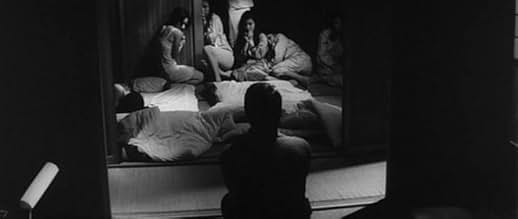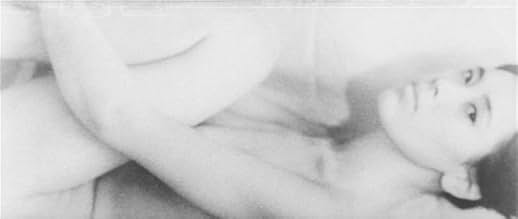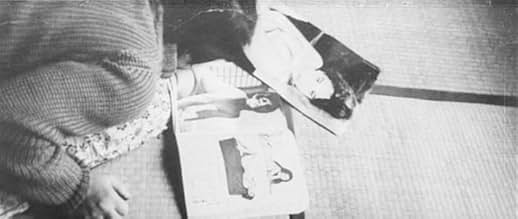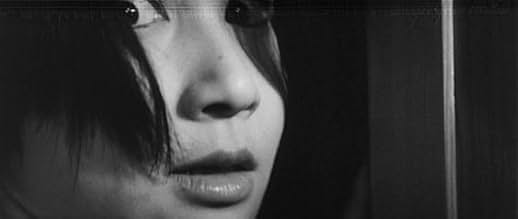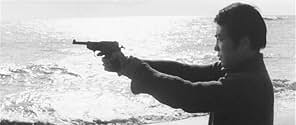Okasareta hakui
- 1967
- 56 Min.
IMDb-BEWERTUNG
6,8/10
1718
IHRE BEWERTUNG
Füge eine Handlung in deiner Sprache hinzuA young man breaks into a nurse's rooming house and one-by-one kills off nurses.A young man breaks into a nurse's rooming house and one-by-one kills off nurses.A young man breaks into a nurse's rooming house and one-by-one kills off nurses.
Jûrô Kara
- The Handsome Boy
- (as Juro Kara)
Junko Natsu
- The Young Girl
- (as Michiko Sakamoto)
Empfohlene Bewertungen
Though it's not my favorite of his works, pinku pioneer Koji Wakamatsu's "Violated Angels" is another example of the film-maker's groundbreaking proficiency for misogynistic sleaze. That said, this film just so happens to 'flow' with an undeniable artistry, as seen in his other earlier films, such as "The Embryo Hunts in Secret" and "Go Go Second Time Virgin".
The idea here is obviously modeled after the Richard Speck murders - a dorm full of nurses find a guy lurking around outside at night and decide to drag him in to peep on two of the lesbian girls going at it. This is a strange and implausible decision, but who am I to judge the questionable generosity of a bunch of young, naive bitches... Unfortunately for the girls, seeing sensual lesbian passion pushes him over the edge, so he snuffs off the rug-munchers and tortures the rest of the terrified girls for the rest of the night...
If you're cool with an 'arthouse' approach to violent exploitation, then I don't think you'll have any problems with this one. It's pretty damn mean for it's time - featuring some relatively 'disturbing' depictions of rape and some torture and mutilation (though mostly implied, but we're given a shot of the aftermath). The most 'graphic' moment being a scene in which a luger is jammed in a chick's ass and fired. "Violated Angels" is not Wakamatsu's best or most 'offensive' film, as far as I'm concerned, but for those into pinku cinema it definitely helped to lay the foundation for this type of genre. It's a very bleak and harsh film, especially by 60s standards.
More Gorepump reviews @ swinesewage.blogspot.com
The idea here is obviously modeled after the Richard Speck murders - a dorm full of nurses find a guy lurking around outside at night and decide to drag him in to peep on two of the lesbian girls going at it. This is a strange and implausible decision, but who am I to judge the questionable generosity of a bunch of young, naive bitches... Unfortunately for the girls, seeing sensual lesbian passion pushes him over the edge, so he snuffs off the rug-munchers and tortures the rest of the terrified girls for the rest of the night...
If you're cool with an 'arthouse' approach to violent exploitation, then I don't think you'll have any problems with this one. It's pretty damn mean for it's time - featuring some relatively 'disturbing' depictions of rape and some torture and mutilation (though mostly implied, but we're given a shot of the aftermath). The most 'graphic' moment being a scene in which a luger is jammed in a chick's ass and fired. "Violated Angels" is not Wakamatsu's best or most 'offensive' film, as far as I'm concerned, but for those into pinku cinema it definitely helped to lay the foundation for this type of genre. It's a very bleak and harsh film, especially by 60s standards.
More Gorepump reviews @ swinesewage.blogspot.com
I saw this film about 20 years ago and remember it as being particularly nasty. I believe it is based on a true incident: a young man breaks into a nurses' home and rapes, tortures and kills various women.
It is in black and white but saves the colour for one shocking shot.
At the end the film seems to be trying to make some political statement but it just comes across as confused and obscene.
Avoid.
It is in black and white but saves the colour for one shocking shot.
At the end the film seems to be trying to make some political statement but it just comes across as confused and obscene.
Avoid.
A voyeur, invited into a dormitory for nurses, remains behind to violate and murder close to a dozen of them. Some of the nurses attempt to talk him out of ending their lives and much of the film is comprised of these conversations, but the talk doesn't do much good.
Most of the film is black and white and quite murky, but there are selected snippets of color to illustrate the aftermath of the killer's work.
Bleak and slow moving, Wakamatsu attempts to provide a political subtext for the nastiness, but it comes across as pretentious.
The stabbings, rapes and beatings are shot mostly at a distance, but the tone is upsetting and the constant screaming and general air of misery is palpable.
The score, by Wakamatsu, is hypnotic.
Not great cinema, but a sincere study of misanthropy.
Most of the film is black and white and quite murky, but there are selected snippets of color to illustrate the aftermath of the killer's work.
Bleak and slow moving, Wakamatsu attempts to provide a political subtext for the nastiness, but it comes across as pretentious.
The stabbings, rapes and beatings are shot mostly at a distance, but the tone is upsetting and the constant screaming and general air of misery is palpable.
The score, by Wakamatsu, is hypnotic.
Not great cinema, but a sincere study of misanthropy.
In 1966 Richard Speck had himself quite a killing spree, 8 nurses in a row with the excuse that it just wasn't their night. In tasteful and proper fashion this unsettling exploitation riff came just a year later, brought to us in inimitable early pinku style by the great Koji Wakamatsu. Ill advised nurses find a watcher outside their boarding house and invite him in to spy upon their companions lesbian passion not realising that the guy is totally unimpressed by lesbianism (or indeed women in general) and soon come to realise their mistake. Established by an opening montage of breasts, eyes and dead smiles the audience can see that Boy (as he is solely called) feels nothing for the female form but little prepares for his murderous tendencies, nor the clammy, helpless horror of the piece. Trapped within their house, isolated by the constant howl of wind and sea, made helpless by their massed, selfless desire to survive, to not ruffle their captor lest any action lead to another death, their numbers fall despite their righteousness and its harsh to watch despite the relative lack of graphic material, the sheer unfeeling menace is all that counts. Juro Kara is grimly effective as Boy, plagued by visions of mockery yet without any self knowledge, a disturbing blank savage and well backed up by the various actresses, characterised simply as Nurse A, B, etc. with one pulling off a particularly potent moment as she desperately tries to reason through the situation. The shooting is generally static, lots of long shots and very little dynamism, conveying an effective hopeless claustrophobia that works well with the performances, all contributes to a locked in fatalistic ambiance that is just perfect. It all feels cold and sincerely misanthropic if not naturalistic (those apt to pointlessly pick holes will likely have a field day), committed to its dark vision, this definitely aided by the stark black and white cinematography, a very much dead and gone palate all the more effective for being spiked by a couple of splashes of lurid colour to show us the bloody extent of what we have seen. There isn't much depth to this one and the ending does spin things out into pretentious territory by aiming for broader social significance but the bulk of the film is as good a study in focused misogyny as I've seen in a while and it has nudity to boot which is a definite plus. On the whole a definite good 'un with two or three stand-out scenes, not for the casual viewer but a thumbs up from me.
Wusstest du schon
- WissenswertesInspired by the 1966 Richard Speck case.
- VerbindungenReferenced in Jessy - Die Treppe in den Tod (1974)
Top-Auswahl
Melde dich zum Bewerten an und greife auf die Watchlist für personalisierte Empfehlungen zu.
- How long is Violated Angels?Powered by Alexa
Details
- Laufzeit56 Minuten
- Farbe
- Sound-Mix
- Seitenverhältnis
- 2.35 : 1
Zu dieser Seite beitragen
Bearbeitung vorschlagen oder fehlenden Inhalt hinzufügen

Oberste Lücke
By what name was Okasareta hakui (1967) officially released in Canada in English?
Antwort
